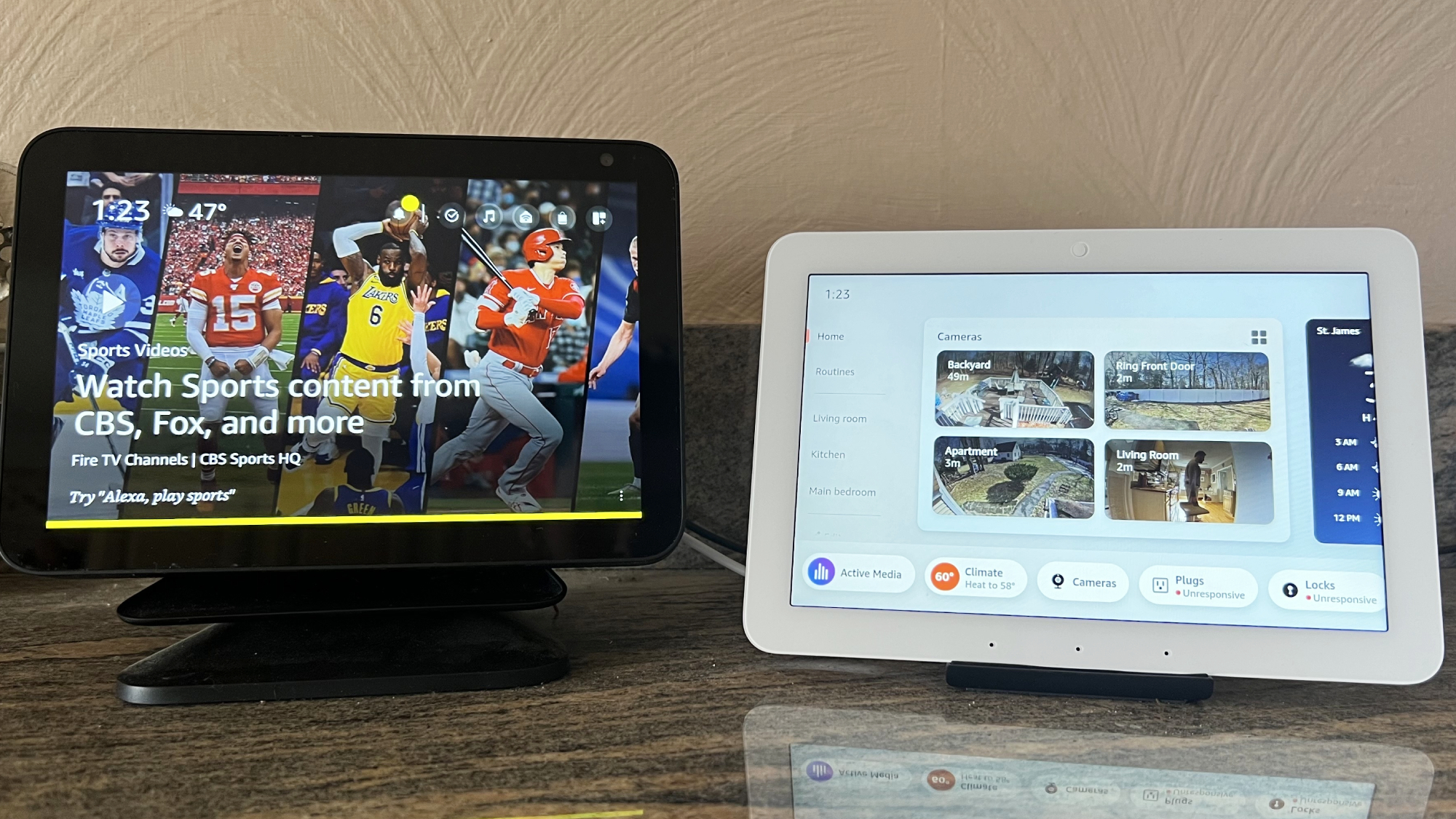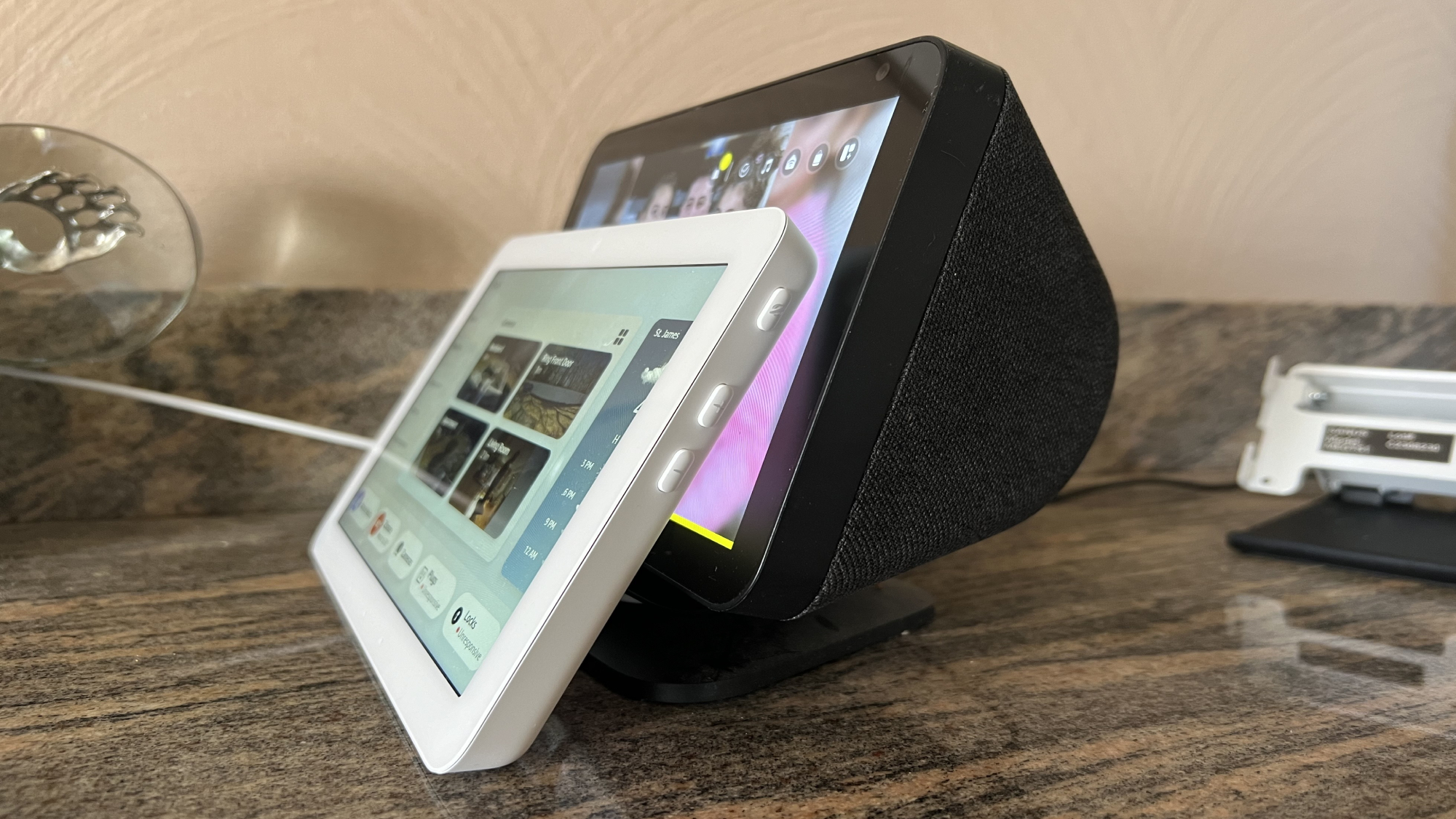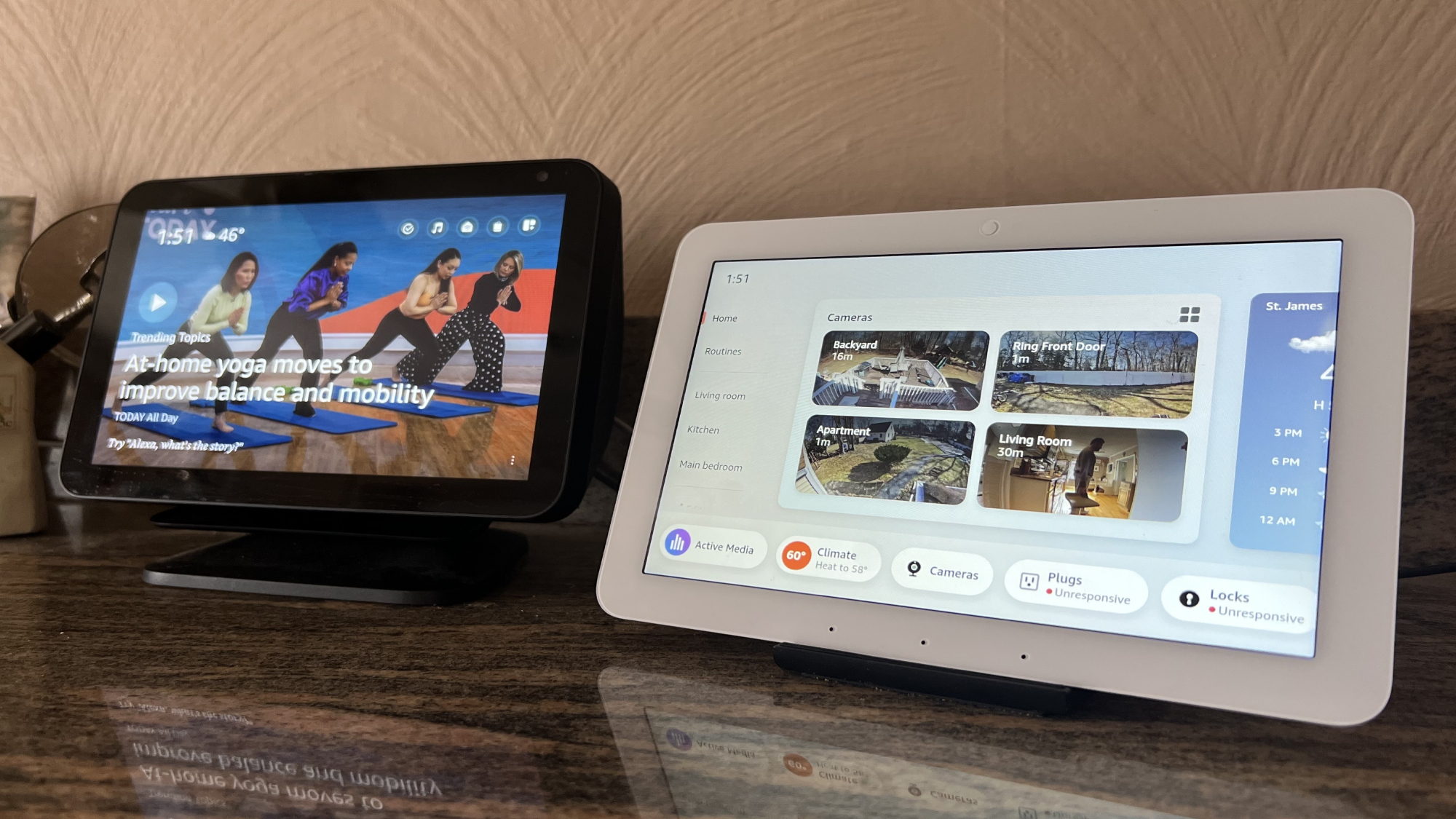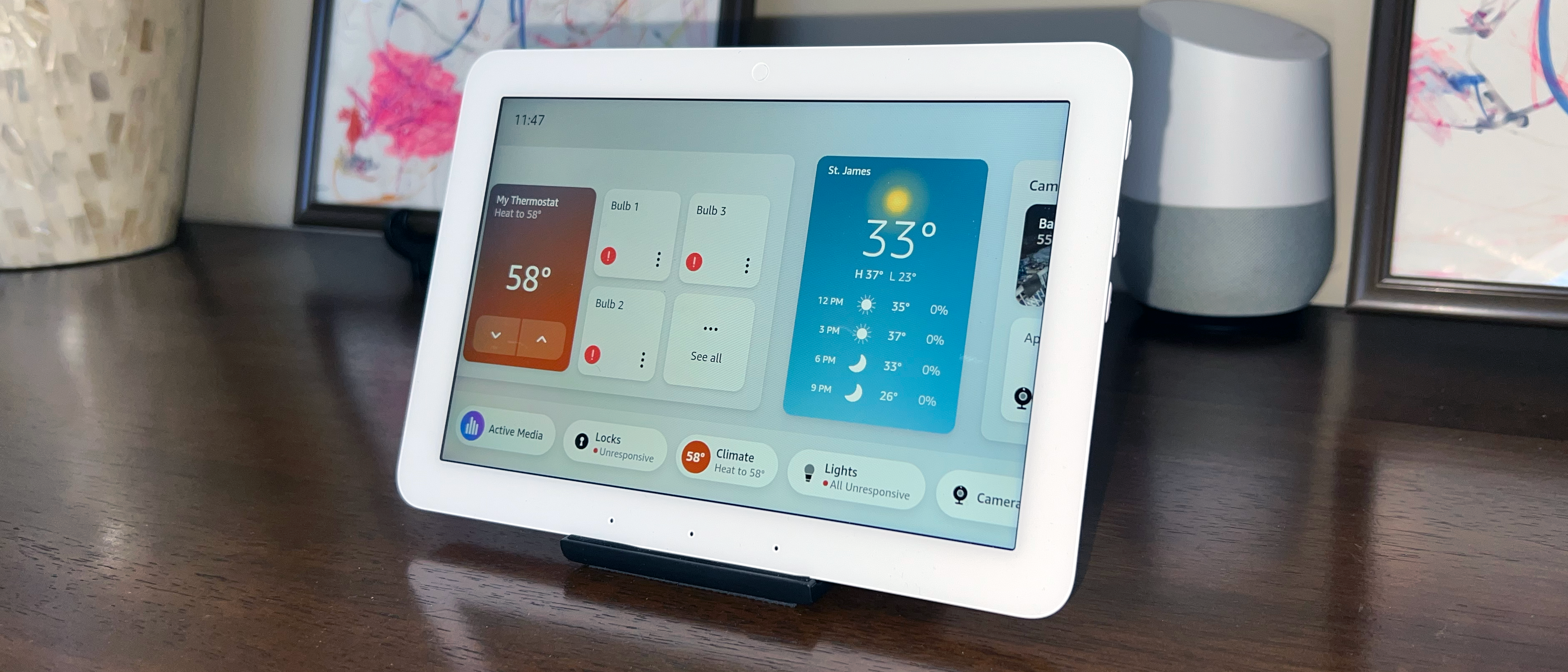Amazon Echo Hub vs. Echo Show 8: Which smart display is best for you?
We put Amazon's two smart home hubs head-to-head to look at price, features, and more.

Amazon reigns king of the best smart displays we've tested. The brand's Echo Show lineup is perfect for watching shows, listening to music, and controlling a handful of the best smart home devices. These screens come in a variety of options that range from a 5-inch Echo Show 5 to the sizable Echo Show 15. But smart home management frequently takes a backseat to ad bloat and new content recommendations.
That's where the new Echo Hub smart home controller comes in. This Alexa smart display has a clean, completely customizable interface that consists of live widget panels front and center—so you can see multiple live camera feeds, the status of your home devices, and controls. Mount it to your wall like you would a smart thermostat or alarm panel and it'll show the time and your favorite photos from a distance.
Both the Echo Show 8 and the Echo Hub smart displays are useful additions to any home, but which you should get comes down to the way you plan to use it and how many connected smart home devices you own. Read on to see a breakdown of the features and costs of both to find which is the best fit for you.
Echo Hub vs. Echo Show 8: Pricing and options
Editor's note: This section relies on the original pricing for all of the various smart displays, but prices tend to fluctuate due to frequent Amazon sales, which may make one smart display a better bargain than the other.
Amazon's Echo Hub comes in just a single 8-inch model for $179.
The Echo Show lineup comes in four different options named after the size of their screen: the Echo Show 5 ($65), the Echo Show 8 ($149), the Echo Show 10 ($199), and the massive Echo Show 15 ($279).
For this showdown, we're going to compare the $179 Echo Hub to the Echo Show 8 $149, since they're the same size as well as most alike in price and features.
Sign up to get the BEST of Tom's Guide direct to your inbox.
Get instant access to breaking news, the hottest reviews, great deals and helpful tips.
Winner: Echo Show
Echo Hub vs. Echo Show 8: Specs compared
| Row 0 - Cell 0 | Echo Hub | Echo Show 8 |
| Price | $179 | $149 |
| Screen | 8 inches/1280 x 800 | 8 inches/1280 x 800 |
| Camera Video Quality | No camera | 13MP |
| Speakers | Pair of top ported full range speakers, with stereo playback | Dual two-inch tweeters, Amazon spatial audio and room adaption tech |
| Widgets | Over 20 live always-on widgets | Up to 6 buttons that require a tap |
| Smart Home Connectivity | 802.11a/b/g/n/ac Wi-Fi, Bluetooth, Sidewalk, Zigbee, Matter, Thread | 802.11a/b/g/n/ac Wi-Fi, Bluetooth, Sidewalk, Zigbee, Matter, Thread |
| Size | 7.9 x 5.4 x 0.6 inches | 7.9 x 5.5 x 4.2 inches |
Echo Hub vs. Echo Show 8: Design

Amazon's Echo Hub is a sexy touchscreen panel that's both smaller and flatter than the Echo Show 8. The Echo Hub can be mounted flush against your wall, but it can be placed on a stand as well. By comparison, the Echo Show 8 is a relatively chunky device that needs to be placed on a surface such as a counter or a shelf.
While both smart displays are equipped with vibrant 8-inch screens, the Echo Show's beefier 5-inch depth stores much stronger speakers that fill a room and support spatial audio. Unfortunately, this addition leaves a thick overhang out the back of the screen and prevents the device from being installed on a wall.
The Echo Show 8 comes in a black or white option versus the Echo Hub's single glacier white colorway, but the sleeker Echo Hub outshines it in terms of looks and versatility any day of the week.
Winner: Echo Hub
Echo Hub vs. Echo Show 8: Interface

Both smart displays have a similar setup process that involves authenticating the device with a code and then picking a background photo. That's where the shared user experience ends.
The Hub's lightweight interface is well spaced out and entirely customizable—you have your individual rooms and routines laid out in a list on the left hand side of the screen so you can quickly hop between them. Meanwhile, you can fill the screen's main section (center and right side) with dozens of widgets like a multicamera live feed and controls such as the temperature of a smart thermostat. You can add more widgets to the main screen and access them by scrolling to the right. Since you can arrange each widget block you can move less pressing information like the week's weather forecast further from the center of the screen. Along the bottom of the screen is individual device categories that you can reorganize.
On the other hand, Amazon's Echo Show is more locked down and filled with bloat. You can only add four tiny widget buttons at a time which you have to tap to access things like your top connections or controls for your favorite smart home devices. That's an added step to getting things done and the Show just feels busier at all times switching between a digital photo frame and billboard as you can see in the picture above.
Winner: Echo Hub
Echo Hub vs. Echo Show 8: Features
| Row 0 - Cell 0 | Echo Hub | Echo Show |
| Video calls | No | Yes |
| Customizable interface | Yes | No |
| Trigger for routines | No | Yes |
| Spatial audio | No | Yes |
| Eero Wi-Fi Built-in | No | No |
The Echo Hub focuses on smart home management with sacrifices that make it a less ideal lifestyle device for consuming media or making video calls, since it lacks decent speakers and a camera.
When it comes to video performance both share an equivalently bright screen but the sound is much richer from the Echo Show. Plus, its built-in camera to act as a security system and center for video calls.
Video Calls
While both Echos can be used as a home intercom system to drop in on all of your other Echo devices, the Echo Show has a camera for two-way video calls. You can make video calls with it on Alexa or third-party platforms like Zoom.
The Echo Hub doesn't have a camera at all; just a proximity and ambient light sensor to switch from a digital photo frame to a command center when you get close and ensure the screen brightness matches the environment.
Customizable Interface
The Echo Hub's highly customizable widget-based menu lets you put live information and interactive controls for your most important devices at your fingertips. These widgets are always in view so you can see if your front door's smart lock is active and track tasks with a calendar and to-do list.
The Echo Show's main menu is a rotating carousel of visuals that switches between a digital photo frame and information that it cycles through. It squishes four widget buttons into the top right corner which is not only difficult to select these tiny options but adds a layer of friction to getting things done.
Trigger smart home routines
The Echo Show's camera can be used as a trigger for smart home automation. For example, if it detects you've entered a room it can turn on lights or raise your smart thermostat. The Echo Hub has a proximity sensor but can't be used as a trigger for smart home automation in the same way.
Spatial Audio
Sound on the Echo Hub is acceptable but falls flat and lacks bass entirely—Amazon encourages you to hand off music to your connected smart speaker or speaker group. The Echo Show has room-filling speakers with deep rumble, spatial audio to place layers in a space, and richer for a better overall media playback experience.
Eero Wi-Fi
Neither the Echo Hub nor Echo Show 8 have built-in Eero Wi-Fi support like the latest Echo Dot smart speakers.
Winner: Echo Show
Echo Hub vs. Show: Smart home compatibility

Both the Echo Show and Echo Hub will run any Alexa smart home smoothly. The Echo Hub doubles down on being a smart home panel and hub.
They both act as capable smart home hubs with the addition of Zigbee, Thread and Matter. These protocols help you bolster your smart home without needing to setup individual device hubs, improving action speeds, and letting you still turn on your smart home devices when the internet service is off. Additionally, you can easily link new smart home gadgets by saying Alexa search for devices.
Yes, the Echo Show 8 can do almost everything the Hub can do, but some features give the Hub an advantage. For one, it can view up to six live cameras simultaneously. The Hub also acts as an alarm panel for arming or disarming the Ring security system, which the Echo Show lacks.
Winner: Echo Hub
Echo Hub vs. Show: Overall Winner
| Row 0 - Cell 0 | Echo Hub | Echo Show |
| Price | Row 1 - Cell 1 | X |
| Design | X | Row 2 - Cell 2 |
| Interface | X | Row 3 - Cell 2 |
| Features | Row 4 - Cell 1 | X |
| Smart Home Compatibility | X | Row 5 - Cell 2 |
| Total | 3 | 2 |
The Echo Show 8's more versatile tool set, like the ability to make video calls and act as both a security camera as well as automation trigger will give it the edge over the Echo Hub for most people. The Show fits into more scenarios whereas the Echo Hub has a much more limited value if you don't have a smart home kitted out with devices to control.
With that said, the Echo Hub's better smart home interface and controls make it the stronger option if you have anything more than just a handful of smart lights and plugs sprinkled throughout your home. Between a better design and a richer smart home experience that lets you quickly lower the temperature or dim the lights, the Hub is a streamlined device for a busy lifestyle.
The best middle ground between both devices is the Echo Show 15, provided you have the space for it. This larger and more expensive Echo Show smart display blends the best of both devices with support for live widgets that are always on the screen as well as a full Fire TV interface into a package that can double as a TV in your kitchen or office. It can even be wall-mounted to boot. However, its speakers are arguably not as good as the Echo Show 8's.
Ultimately, your choice comes down to what you're looking for in a smart display; if smart home device management is your biggest concern, then go with Echo Hub over the Echo Show. But if you want something that doubles as an entertainment device, the Echo Show 8 is the better pick.
More from Tom's Guide

Hunter Fenollol is a Senior Editor for Tom’s Guide. He specializes in smart home gadgets and appliances. Prior to joining the team, Hunter reviewed computers, wearables, and mixed reality gear for publications that include CNN Underscored, Popular Mechanics, and Laptop Magazine. When he’s not testing out the latest cooking gadgets, you can likely find him playing a round of golf or out with friends feeding his paycheck to a QuickHit slot machine. Hunter started his career as an intern at Tom’s Guide back in 2019 while in college. He graduated from Long Island University Post with a degree in Communications and minor in Advertising. He has been vlogging ever since the iPhone 4 took front-facing cameras mainstream.
